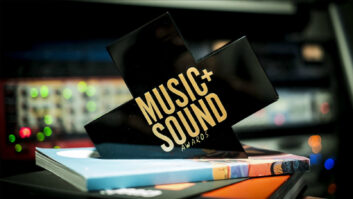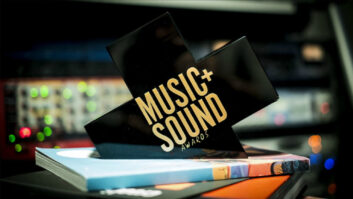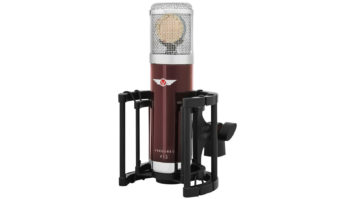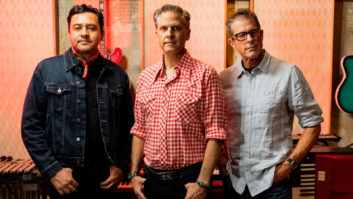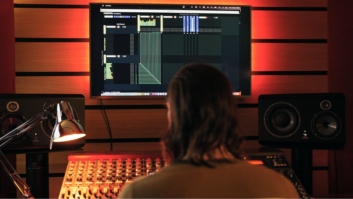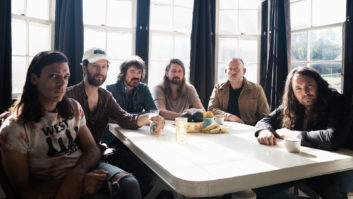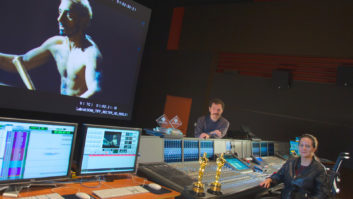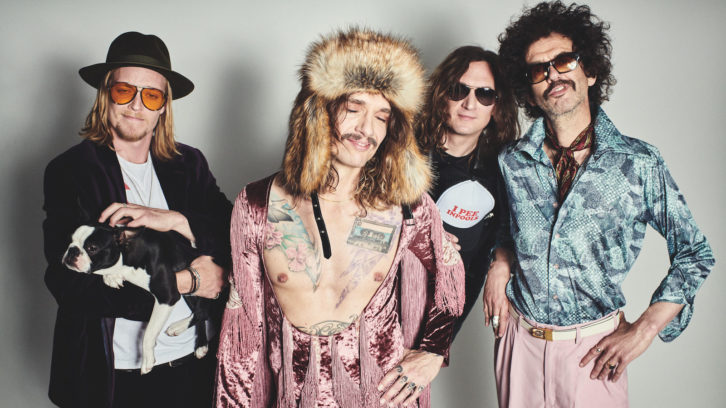
Lowestoft, UK (October 4, 2021)—The business of making records has certainly changed since U.K. glam rock band The Darkness sprang onto the scene just over two decades ago in the English beach resort and fishing port of Lowestoft.
Around the turn of the millennium, it was no big deal to spend nearly a year and an untold fortune recording an album at multiple studios with legendary producer Roy Thomas Baker. Today, with artists crafting mega-hits on laptops in their bedrooms, The Darkness found themselves riding out the pandemic lockdown in a horse stable in the English countryside recording their latest album release, Motorheart. This is not a former stable, by the way—it’s still occupied. “You can hear the horses through the wall. You can smell the horse shit,” laughs lead guitarist and producer Dan Hawkins, on whose property, a 32-acre slice of Sussex countryside south of London, the stable sits.
Hawkins is an avowed audio gearhead. By the time he and brother Justin, lead singer and a multi-instrumentalist, formed the band, Dan already had years of recording experience behind him. As the money rolled in from the band’s early commercial success—a multi-platinum debut album, Permission to Land, and hit single, “I Believe in a Thing Called Love”—he invested it in Leeders Farm. Originally intended as his home and a private rehearsal studio for the band, it soon grew into a residential studio for hire, stocked with top vintage analog equipment. Then, 10 years ago, he sold the farm.
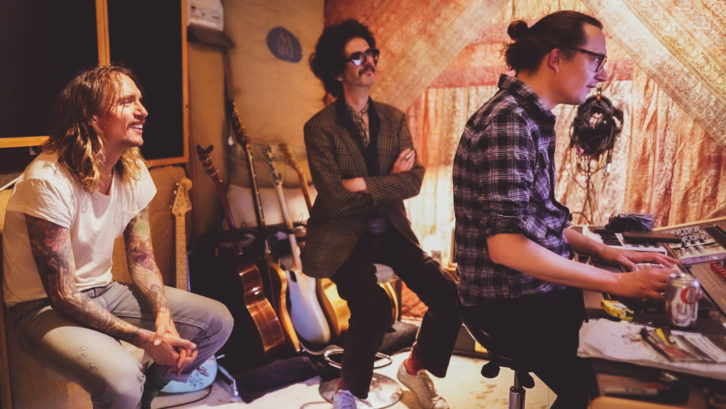
THE QUEEN-RTB CONNECTION
History repeats itself, as Hawkins’ temporary studio-in-a-stable is now mushrooming. He’s about to build a large live room, turning the horse barn into a control room. A 56-input SSL 4000E console that was installed in 1985 at The Farm, the private studio owned by Genesis, sits ready for recommissioning.
“It was never meant to be a studio; it was one of those things that got out of hand,” Hawkins says. “There are millions of people like me who have been obsessed with pro audio since birth. You just can’t help yourself.”
Things do tend to get out of hand around The Darkness. Case in point: Sophomore album One Way Ticket to Hell …and Back. “We’ve only just recouped from our first two albums,” Hawkins reports. “No wonder; six months at Rockfield, three months at Whitfield Street. We spent a month mixing at the Village—while staying in the Beverly Hills Hotel!”
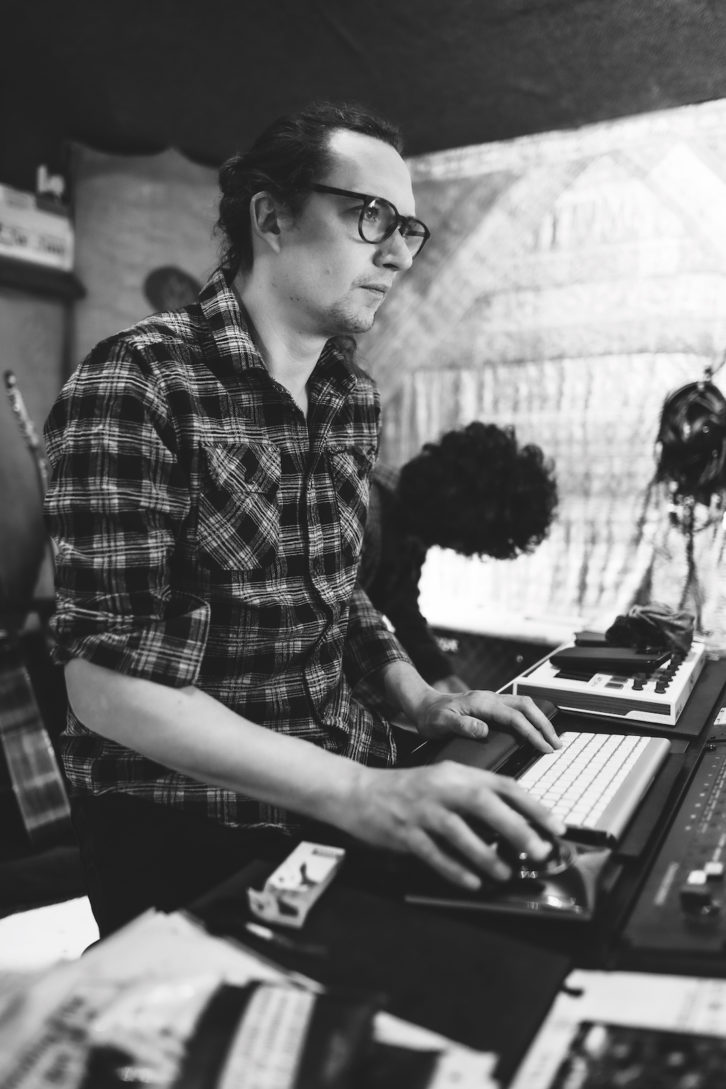
The music of Queen is an obvious touchstone for The Darkness so it’s no surprise they enlisted Baker, who worked on five Queen albums, to produce One Way Ticket. For Hawkins, it was an opportunity to learn from a master.
“We were very close, Roy and I, during the making of that album, because it took so long and we were left to it; he and I were in Rockfield for months,” Hawkins says. During writing and pre-production, Baker even stayed at Hawkins’ house and helped him with plans for the Leeders Farm studio.
“Although my production career started a bit earlier—uncredited I might add; I co-produced the first album with Pedro Ferreira—I would never have called myself an engineer at that point,” Hawkins says. “It was Roy that sparked my interest in that. He taught me how to EQ. He showed me how he did it, for each instrument. “Roy is very focused; when he’s working, he doesn’t like to be distracted,” he continues. “It’s a case of not asking questions but just watching like a hawk all the time. I would see him doing things and wonder why he was doing it. Years later, now that my engineering skills have gotten better, I know why he did it.
LOCKED DOWN IN THE BARN
For the band’s latest album, Hawkins set up his gear—some of it retained after he sold Leeders Farm—in about half of the 500-square-foot stable. “I kept a load of the microphones—the usual suspects, and a few bits of outboard, like 1176s,” he says, adding ruefully, “I’ll never forgive myself for selling the Neve Melbourne.”
Although his signal chain tends to change over time, he says, “For years, I’ve been using a Chandler Mini Rack with an extender, 32 channels of EMI line amps for my summing, running Pro Tools into that. On my mix bus, I have a Smart C2 [compressor] and a Retro 2A3 [dual program EQ] for a bit of top and bottom.”
Hella Mega Yeah! Behind the Audio of the Summer’s Biggest Tour
On his front end, he says, “I’m a big fan of BAE. I bought a load of the original BAE 312s, their first attempt at re-creating those amazing API pres I have four or five of the original metalknob versions and I haven’t heard anything better for drums. For the last six or seven years, every bass I’ve recorded on every album I’ve produced has been plugged straight into one of those original BAE 312s.”
Writing began during the tightest of U.K. lockdowns, with the band’s drummer, Rufus Taylor, accessing the drum booth through a separate door while Hawkins stayed in the control room.
“It was fortunate because this is the way we make records anyway,” Hawkins explains. “I tend to have a load of riffs; I bring Rufus in and he plays drums. I have his drum kit miked up from the start, I play the guitar and we communicate over headphones. We don’t really do rehearsals. I’m doing all the pre-production then and there because it’s all in my head; I’m engineering and producing at the same time—so nothing really changed.”
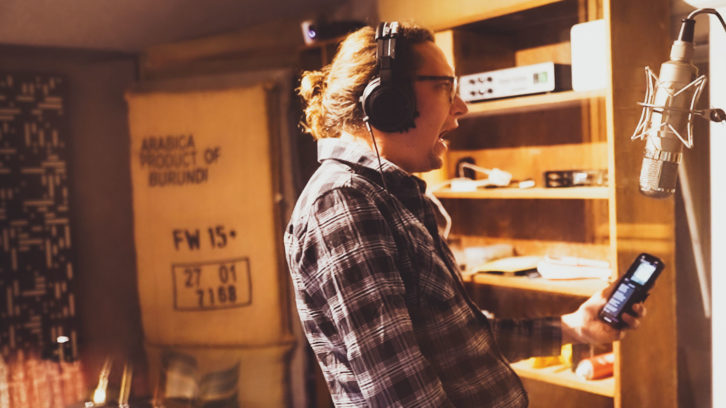
REMOTE TRACKS, APPROVALS
Hawkins would then edit the tracks, add some guide guitars and send them to his brother, who lives in Switzerland. “He would live with the track for a while and send back his vocal ideas to see whether we liked them,” brother Dan says. With the band scattered—Taylor lives in London and bassist Frankie Poullain is in southwest England—everyone would approve the lyrics using WhatsApp. There were typically few comments: He hit the nail on the head every time.
“Then I’d continue to work with Justin. I’m really particular about finding the perfect key for the song. We used this plug-in called Audiomovers; I’ve got his mix bus and he’s got mine, and I’m recording as he auditions takes. Sometimes I would forget he wasn’t actually in the vocal booth.”
Once Justin sent over his master take, Dan would track the guitars. “I would get Ian Norfolk, who is my guitar tech and also a great engineer, to record me,” he says. “I get the sound moving the mics, changing EQs and switching pres until I’ve got it where I want it, but when it comes to stopping and starting and pressing the spacebar, he records me.”
Hawkins also plays guide bass on the early versions, he says. “So right at the end of the session, I would call Frankie to do the bass. And then I mixed it.”
Hawkins is notorious for making changes up to the last minute, it seems, and he’s okay with that: “I always thought that was a failing as producer, then I read an interview with Mutt Lange and was relieved to see that he’s the same. I’m infamous—the guys will approve a mix then hear the master and go, ‘Is that a mandolin?!’ But there’s always room for experimentation.” Motorheart will be released via Cooking Vinyl on November 19.
